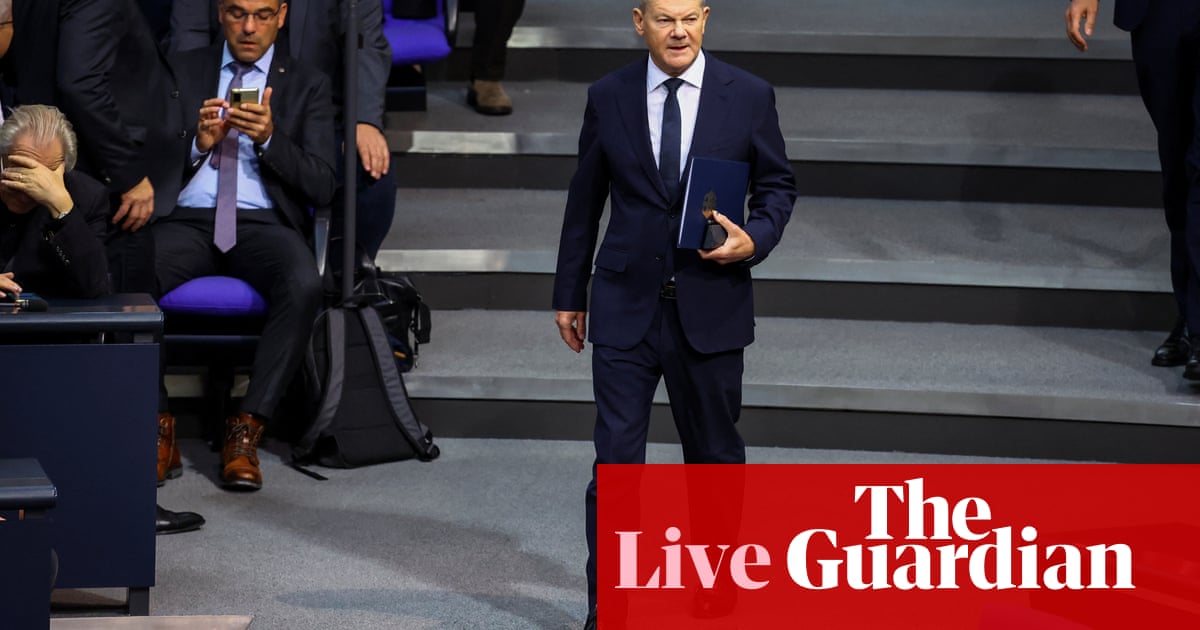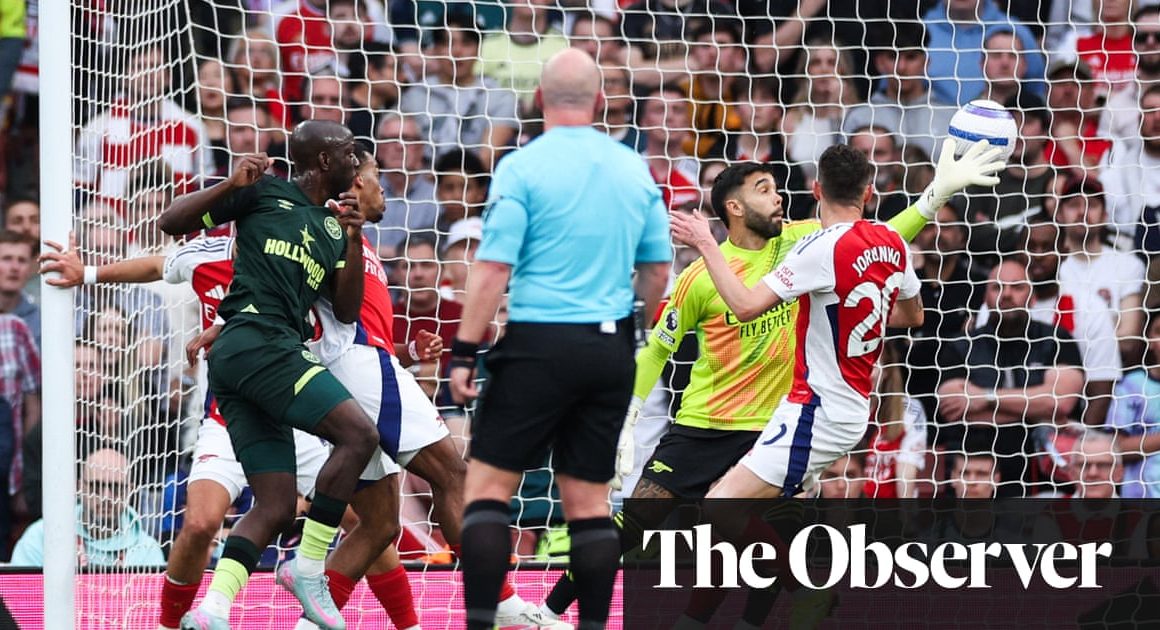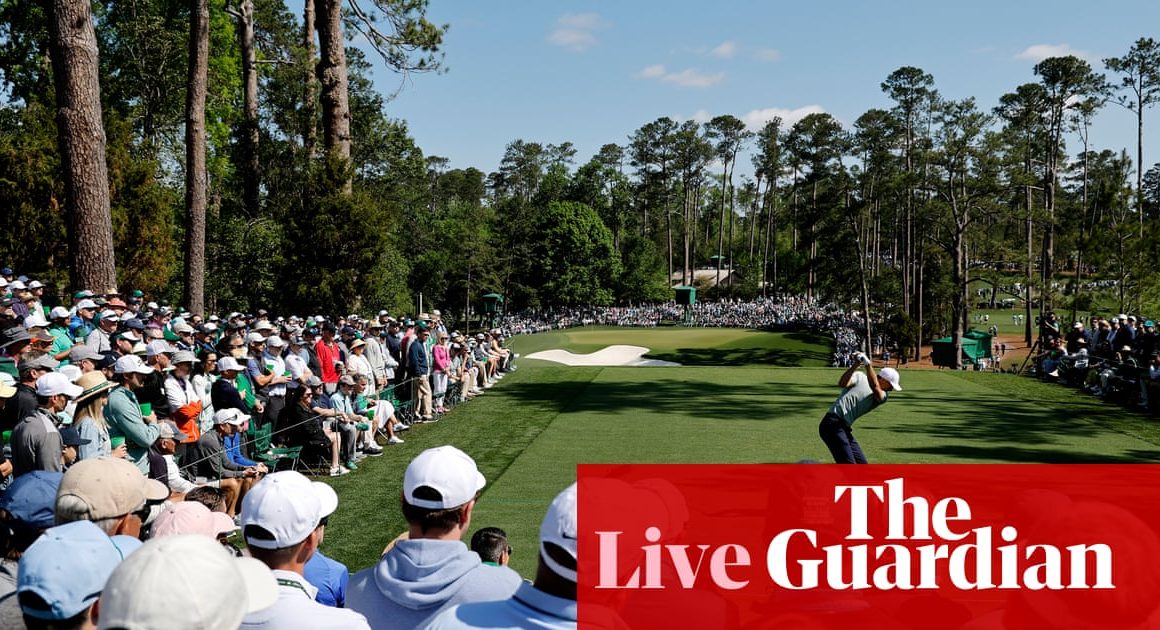Merz announces plans to backtrack on climate action

Kate Connolly
Friedrich Merz is laying into the AfD, sitting in flamboyant, fiery and rambunctious mode to his right hand side, repeating with a jab of his finger in his direction, his pledge that he would, as chancellor, never work together with the party.
This will come as a relief to those who have sometimes feared there was a crack in the firewall that CDU members and other mainstream parties have erected in insisting there will be no cooperation with the far-right populists.
Merz in almost the same breath, lays into Scholz, saying that Germany needs a “completely different type of politics”, that this is “urgently needed”.
He announces, like a quick fire shopping list, his plans to backtrack on the government’s climate policies, to tackle immigration control, to boost Germany’s status as a modern transport hub, its digital standards.
He accuses Scholz of only now reaching out for cooperation from the CDU/CSU, at a time when it wants to bring its government to a more graceful close, but says he will not play ball.
He says cooperation can only take place once Scholz has faced the vote of confidence in parliament – on December 16.
He again makes a dig at the AfD, angrily asking: “Is that all you’re capable of? Screaming at us from the sidelines?”
Key events

Kate Connolly
Annalena Baerbock of the Greens, and Germany’s foreign minister, has stepped in for her colleague Robert Habeck, economy minister and deputy chancellor, who, embarrassingly and inconveniently at such a historic moment, is stuck in Lisbon due to his government plane breaking down.
Baerbock takes the bull by the horns on this one, knowing that the government is going to get a lot of stick for this. A member of the AfD shouts the question: “why didn’t he take a cargo bike?” in a dig at the Greens’ push for car and plane-free mobility. Baerbock scoffs at this and suggests they can now save themselves from using this as an election slogan.
Baerbock stresses again the government’s support for Ukraine, and says as the world gets more complicated, with drone attacks on Ukraine likely to get heftier over Christmas, and Putin caring not a jot about the German election results, Germany has to continue to recognise the particular responsibility it has in the times ahead, to contribute to international security.
She says if asked by her kids in 10 years time, what Germany did, and did Europe act collaboratively, she wanted to say it had acted responsibly and helped to strengthen security.
The new US administration would not make life easier, she said, at the same time as stressing that it was a choice of US voters that had to be respected. Germany’s answer had to be to work in a spirit of cooperation with other countries, she said.
“Our answer to America First cannot be Germany First, as some here have suggested,” she said. “But Europe United – with a strong Germany.”

Kate Connolly
Merz accused Scholz of dividing Germany, in contrast to what Scholz himself has just stated – the desire he has to stop a US-style polarisation of the country – and of having lost touch with reality.
The opposition leader complained of artificial intelligence generated images of himself doing the rounds on social media, although he doesn’t go into detail. He said the fact that they are being distributed online by members of Scholz’s SPD is an indication, of “foretaste of the type of election campaign” to come, accusing the SPD of being prepared to strike below the belt. Scholz, donning black spectacles, peers at his mobile phone and doesn’t react to the accusation.
Merz’s speech is met by rousing applause from the benches of his conservatives.
Merz received warm and sustained applause after his speech.
Now up is Green party co-leader and German foreign minister, Annalena Baerbock.
Merz calls for totally different approach to migration
Friedrich Merz has said Germany needs a totally different approach to migration policy.
He said a new government must regain control over migration with expulsions at the border.
It is a handbrake turn on the approach of his predecessor Angela Merkel, whose open-door to Syrian refugees in 2015 contributed to more than a million asylum seekers arriving in the EU that year.
Merz announces plans to backtrack on climate action

Kate Connolly
Friedrich Merz is laying into the AfD, sitting in flamboyant, fiery and rambunctious mode to his right hand side, repeating with a jab of his finger in his direction, his pledge that he would, as chancellor, never work together with the party.
This will come as a relief to those who have sometimes feared there was a crack in the firewall that CDU members and other mainstream parties have erected in insisting there will be no cooperation with the far-right populists.
Merz in almost the same breath, lays into Scholz, saying that Germany needs a “completely different type of politics”, that this is “urgently needed”.
He announces, like a quick fire shopping list, his plans to backtrack on the government’s climate policies, to tackle immigration control, to boost Germany’s status as a modern transport hub, its digital standards.
He accuses Scholz of only now reaching out for cooperation from the CDU/CSU, at a time when it wants to bring its government to a more graceful close, but says he will not play ball.
He says cooperation can only take place once Scholz has faced the vote of confidence in parliament – on December 16.
He again makes a dig at the AfD, angrily asking: “Is that all you’re capable of? Screaming at us from the sidelines?”
Opposition leader Merz says Scholz ‘from another cosmos’

Kate Connolly
Friedrich Merz, chancellor in waiting, takes to the podium, and it’s clear from the start that he is trying to separate himself from Scholz as much as possible, even as Scholz called on him to help his government to push through outstanding legislation which was for the good of the nation.
Merz slapped Scholz down saying he was “not from this world”, but “from another cosmos”. He criticised his behaviour in the run up to his government’s collapse. Merz, a lawyer and investment banker who has been waiting for this moment his whole political career, is presenting himself as the diametrical opposite of Scholz, in what is effectively the opening salvo of what is going to be a heated election campaign.
Friedrich Merz, the leader of the Christian Democrats, is now speaking and getting a warm reception from some in the chamber.
He was officially nominated as his party’s candidate in September, putting him in poll position to be Germany’s next chancellor.
A former BlackRock executive, he is a fiscal conservative, who is seen as impulsive even by his allies.

Kate Connolly
Towards the end of his speech, in which Scholz avoided being interrupted by cat calls and jibes from the AfD benches, he spoke of having just read a book by US author and journalist Ezra Klein, Why We Are Polarised – an analysis of political polarisation. He warns of what has happened in the US being repeated in Germany, but saying as a democrat, he will not let that happen. He says polarisation is the “political business model” of certain parties in the Bundestag, a pointed reference to the far-right AfD.
Scholz confirms no Taurus jets for Ukraine

Kate Connolly
In his speech, which has just finished, Scholz – referred to a telephone call he held with US president-elect Trump on Sunday evening, describing it as “a good discussion”. Defending his government’s record he touches in particular on its support of Ukraine, saying Germany has contributed to helping the conflict not to escalate. But he confirms he will not bow to demands for Germany to deliver Taurus jets to Ukraine, even as Merz has suggested he is planning to do just that if he becomes chancellor.
He is receiving warm, but certainly not rapturous support, from the benches of his SPD.
Scholz has finished speaking and a large part of the chamber warmly applauded.
Now it’s Friedrich Merz…

Kate Connolly
Scholz is speaking in a confident and defiant tone, justifying his decision to oust finance minister Christian Lindner, saying it was right, even as he acknowledges, it has led to a change in Germany’s political landscape.
He calls on Germany’s democrats, regardless of their political persuasion, to work together on issues that are important for Germany, “which cannot wait”. He touches on issues his government is still working on, including an initiative to boost growth, plans to increase child support payments and measures to protect the country’s highest instance, the constitutional court.
The members of the AfD – whose benches to the right of Scholz are full – is loud and rowdy, expressing its disapproval of Scholz.

Kate Connolly
Olaf Scholz stresses he’ll need the support of the opposition CDU to push through remaining government reforms before parliament is dissolved. He strongly implies that if these issues – including tax reforms proposed by his former finance minister and an increase in child support payments – are not passed, the CDU will be to blame.
Scholz calls for stronger protection of constitutional court
Olaf Scholz has said there are “urgent topics” where Germany’s parties can reach agreement before the elections. He calls on parties to agree to increase child benefits, and legislate to tackle fiscal drag – when inflation lifts taxpayers into paying higher rates.
Significantly, he also calls for stronger protection of the Germany’s constitutional court.
The court is seen as vulnerable if the far-right and radical left win a third of seats in parliament after elections, as polls suggest they might.
Mainstream parties fear that the far-right Alternative für Deutschland and the nationalist far-left Sahra Wagenknecht alliance could unite to block appointments to the court, slowing down the wheels of justice.

Kate Connolly
Scholz has taken the podium to applause and immediately said it was “necessary, right and unavoidable” to sack his finance minister, and he is grateful that the new election date is set for the end of February.
Scholz confirms vote of confidence dates, paving way for elections

Kate Connolly
Olaf Scholz – unusually fiery and determined in tone – confirms that he will submit an application for a vote of confidence in his government on December 11, to be held on 16 December, to pave way for the 23 February election. “Let us, for the good of the country, work together until the new election,” he appeals to members of the Bundestag, insisting his government will continue its work, despite only having a minority since the departure of the FDP.
Here are some images from the Bundestag ahead of the debate.
Olaf Scholz looks relaxed as he talks to Friedrich Merz, the man who could replace him as chancellor, and Christian Lindner, the erstwhile finance minister he fired last week.
As Kate Connolly writes
The Bundestag is full to the rafters for this significant occasion. Everyone who is anyone is inside the glass-domed hall. Scholz, who has greeted his party and government colleagues with a handshake, is due to take to the podium at 1.20pm local time. He has also shaken the hands of Friedrich Merz, his arch rival and likely future German chancellor, as well as his former finance minister Christian Lindner, who is sitting shoulder to shoulder with Merz. The mood between the men is surprisingly cordial.
Here is another image of Lindner, who has said he expects Friedrich Merz to be Germany’s next chancellor.
And here is defence minister Boris Pistorius, who is far more popular than Scholz and is the favoured SPD chancellor candidate for some, but not expected to run.
MPs in the Bundestag have risen to their feet, as Bundestag session opens.
Chancellor Olaf Scholz is expected to speak at 13.30 CET/ 12.30 GMT.
You can follow it live here












